The AMD Ryzen 3 3300X and 3100 CPU Review: A Budget Gaming Bonanza
by Dr. Ian Cutress on May 7, 2020 9:00 AM ESTCPU Performance: Encoding Tests
With the rise of streaming, vlogs, and video content as a whole, encoding and transcoding tests are becoming ever more important. Not only are more home users and gamers needing to convert video files into something more manageable, for streaming or archival purposes, but the servers that manage the output also manage around data and log files with compression and decompression. Our encoding tasks are focused around these important scenarios, with input from the community for the best implementation of real-world testing.
All of our benchmark results can also be found in our benchmark engine, Bench.
Handbrake 1.1.0: Streaming and Archival Video Transcoding
A popular open source tool, Handbrake is the anything-to-anything video conversion software that a number of people use as a reference point. The danger is always on version numbers and optimization, for example the latest versions of the software can take advantage of AVX-512 and OpenCL to accelerate certain types of transcoding and algorithms. The version we use here is a pure CPU play, with common transcoding variations.
We have split Handbrake up into several tests, using a Logitech C920 1080p60 native webcam recording (essentially a streamer recording), and convert them into two types of streaming formats and one for archival. The output settings used are:
- 720p60 at 6000 kbps constant bit rate, fast setting, high profile
- 1080p60 at 3500 kbps constant bit rate, faster setting, main profile
- 1080p60 HEVC at 3500 kbps variable bit rate, fast setting, main profile
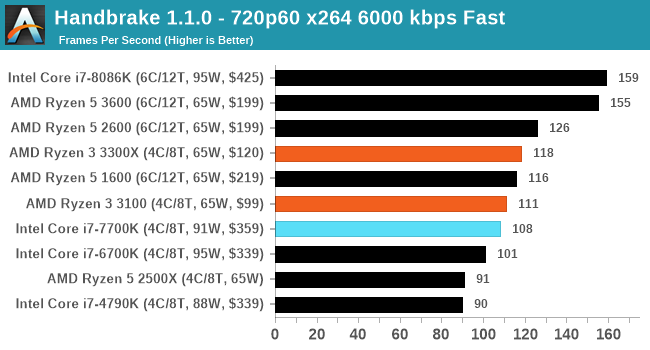
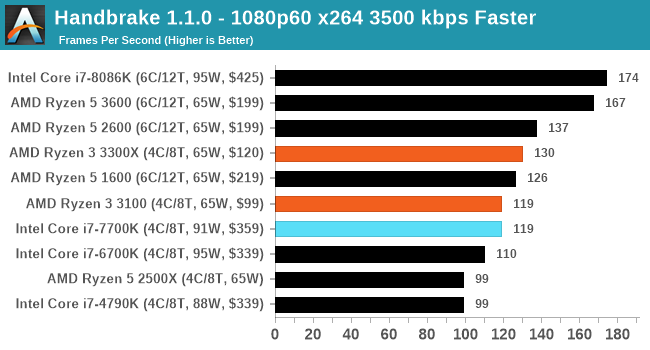
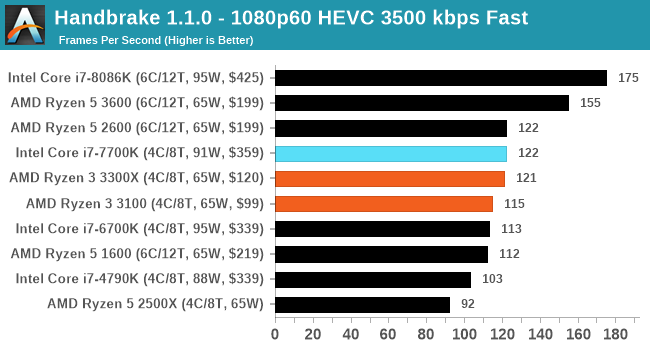
7-zip v1805: Popular Open-Source Encoding Engine
Out of our compression/decompression tool tests, 7-zip is the most requested and comes with a built-in benchmark. For our test suite, we’ve pulled the latest version of the software and we run the benchmark from the command line, reporting the compression, decompression, and a combined score.
It is noted in this benchmark that the latest multi-die processors have very bi-modal performance between compression and decompression, performing well in one and badly in the other. There are also discussions around how the Windows Scheduler is implementing every thread. As we get more results, it will be interesting to see how this plays out.
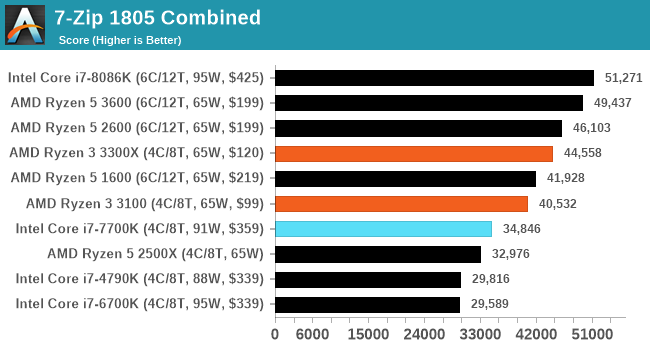
WinRAR 5.60b3: Archiving Tool
My compression tool of choice is often WinRAR, having been one of the first tools a number of my generation used over two decades ago. The interface has not changed much, although the integration with Windows right click commands is always a plus. It has no in-built test, so we run a compression over a set directory containing over thirty 60-second video files and 2000 small web-based files at a normal compression rate.
WinRAR is variable threaded but also susceptible to caching, so in our test we run it 10 times and take the average of the last five, leaving the test purely for raw CPU compute performance.
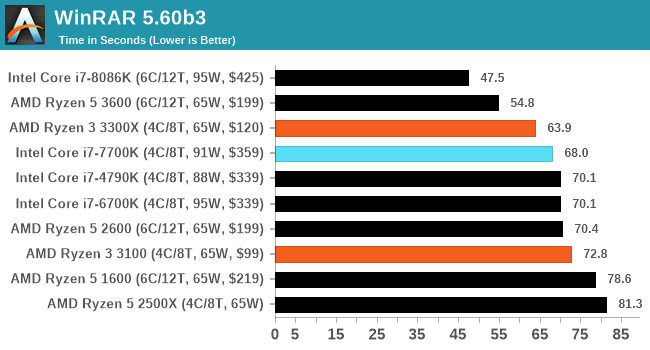
AES Encryption: File Security
A number of platforms, particularly mobile devices, are now offering encryption by default with file systems in order to protect the contents. Windows based devices have these options as well, often applied by BitLocker or third-party software. In our AES encryption test, we used the discontinued TrueCrypt for its built-in benchmark, which tests several encryption algorithms directly in memory.
The data we take for this test is the combined AES encrypt/decrypt performance, measured in gigabytes per second. The software does use AES commands for processors that offer hardware selection, however not AVX-512.
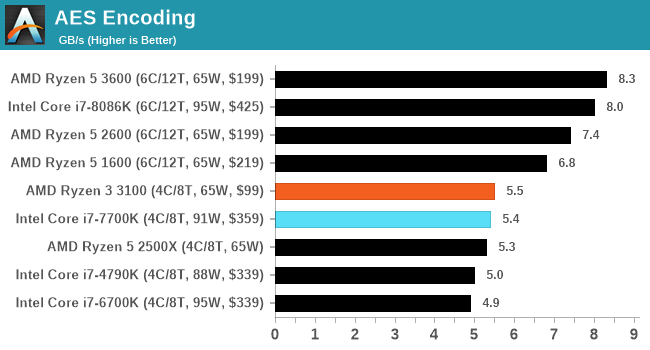










249 Comments
View All Comments
Ian Cutress - Thursday, May 7, 2020 - link
Unfortunately, we never got any of those. I'm recently stretched six ways from Sunday. Pulled an all-nighter just to even get to this point in the review process. As much as people would love me just to bench CPUs all day every day, even in lockdown I've got these CPUs, EPYC, Motherboards, Xeons, laptops to test, as well as news coverage and all the behind the scenes stuff no-one ever sees. Writing isn't a quick process, either.destorofall - Thursday, May 7, 2020 - link
Surely Ian you can just use the AI wirter now :)Lord of the Bored - Thursday, May 7, 2020 - link
The AI Writer read the comments and now just fanboy-flames.eastcoast_pete - Thursday, May 7, 2020 - link
Appreciate the reply! I think the fact that you never got those current-gen i3s and i5s is not on you, but on Intel. If they want their stuff reviewed, they know they need to send some samples. Unless, of course, they're afraid of the test results. Which they might just be.Namisecond - Thursday, May 7, 2020 - link
I just noticed in the "AMD 500 SERIES CHIPSET PROCESSOR SUPPORT" chart; 4000 series/Zen2 based desktop APUs are not represented. An oversight? or is AMD trying to say something?qwertymac93 - Thursday, May 7, 2020 - link
There's got to be something strange going on with the 7700k system. In several benchmarks the 6700k outperforms the 7700k, even though the only difference between them is the 7700k is clocked higher. Under no circumstances should the 6700k outperform the 7700k.Were the Skylake and Kaby lake systems tested with different motherboards or with different BIOS revisions? Its possible some security patch was active on one system but not on another.
EdgeOfDetroit - Thursday, May 7, 2020 - link
You should have benched it against a Xeon E-2174G. At least that's the most modern 4C8T CPU Intel sells right now. But I look forward to seeing how it does against the i3-i3-10320 to see if Intel still has the IPC-clockspeed crown or not.schujj07 - Friday, May 8, 2020 - link
The performance of the i3-10320 will be very similar to the 7700k. The i3 has clock speeds of 3.8/4.6 and the 7700k is 4.2/4.5. That means that on single threaded the 10320 will be slightly faster but in heavily threaded work loads the 7700k will probably be faster due to the higher base clock. This is know because both CPUs are on the Sky Lake architecture and will have the same IPC. Therefore we can infer what the 10320 will do based on what we see the 7700k doing in this review.Sushisamurai - Thursday, May 7, 2020 - link
I think it'd be nice to see generational to generational improvements on intel vs AMD's side of things, you guys use to do that everytime a new generation came out. It'd be nice to see how far my 4th gen Intel chip has gone vs a new gen now.Maxiking - Thursday, May 7, 2020 - link
Again your garbage reviews. Apparently all the cpus on the world are bottlenecking 1080 gtx @ 1080p except 3300x.Do you even think when checking the results. This thing happens constantly, especially when you test low end garbage amd cpus.